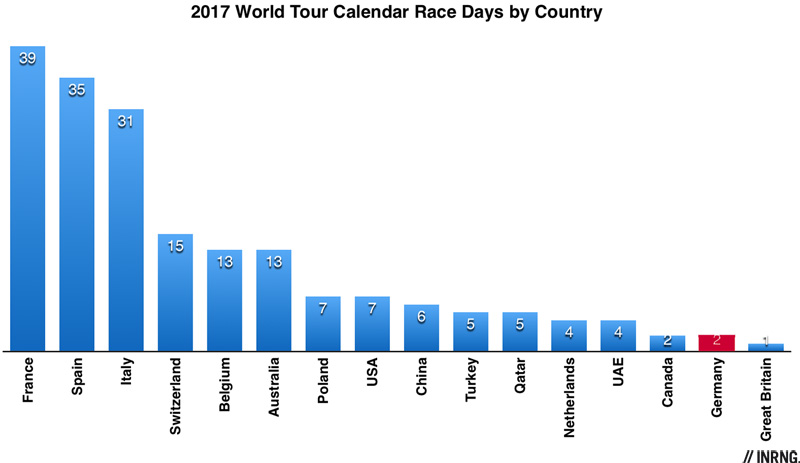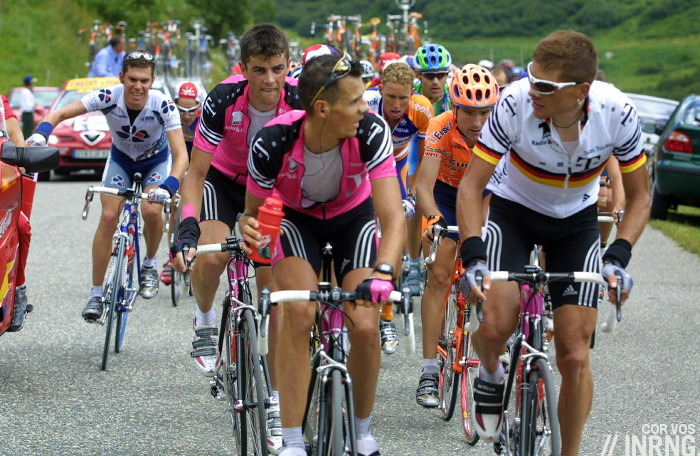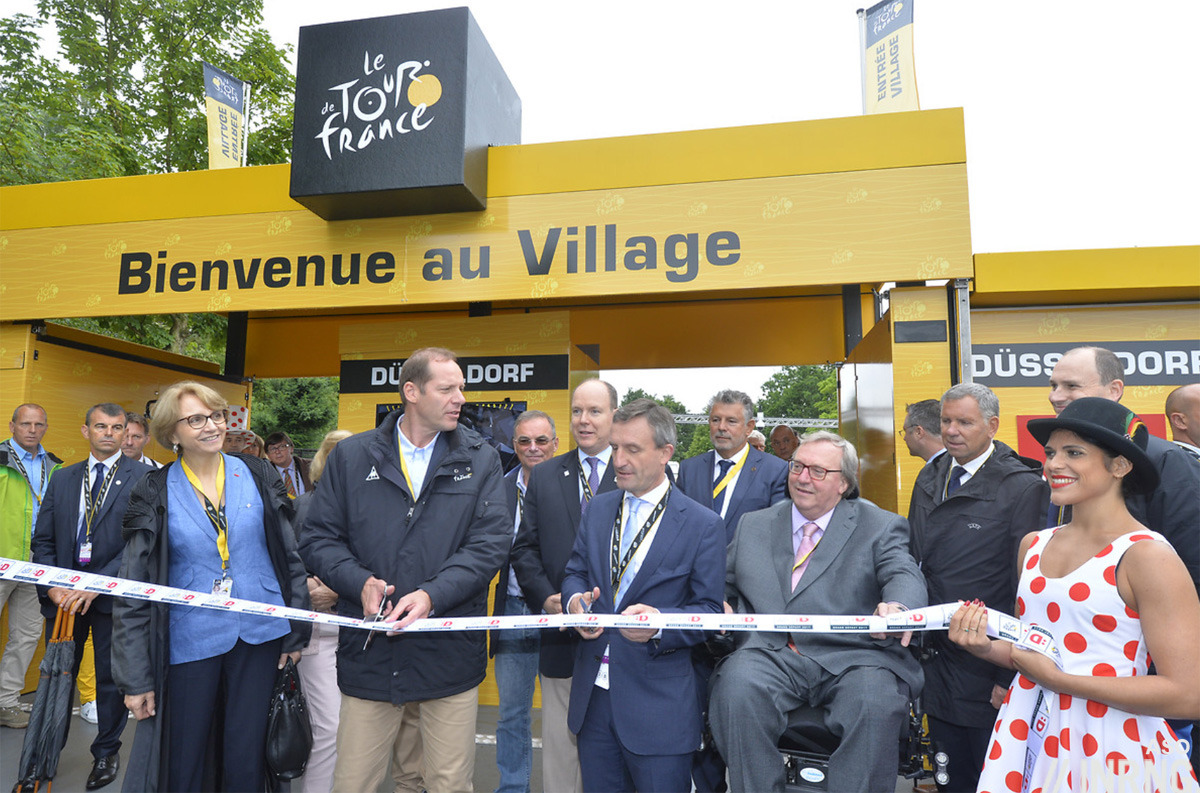The choice of Düsseldorf was no accident. For sure it’s just over the border from France and the Tour de France likes its foreign starts, think of Yorkshire, Rotterdam and London in recent years. These foreign starts pay handsomely for the privilege and Düsseldorf paid close to €5 million. Look at this is an investment by Tour de France and the sport in general in the future of cycling in Germany, Europe’s biggest consumer market but a barren land for pro cycling.
Germany is Europe’s largest country when measured by population, wealth and, increasingly, political clout. Only for years it’s been outside of the pro cycling circuit when measured by the calendar and race days in German, the supply of sponsors and pro teams or the crucial television audiences. For such a nakedly commercial sport where races are supposed to make money, generate publicity and teams are named after consumer brands, being absent from Germany is a commercial headache. How can the sport talk about globalisation if it can’t even reach Germany? Why would a multinational sponsor invest in a pan-European marketing campaign that misses out Europe’s most populous and wealthiest nation?
Sprechen sie Radsport?
It’s a long term problem that the sport is trying to resolve today. Over the last century Germany produced few top cyclists, there was Rudi Altig who won the Vuelta, the Tour of Flanders, Milan-Sanremo and wore the yellow jersey among the highlights but he was an exception because the sport never took off in Germany like it did elsewhere. Another way to look at this is language, to follow the sport is to speak of bidons and the gruppetto, where meta is something you reach rather than abstract, cola del pelotón is place not a drink and we read of Flandriens doing the dubbleslag. But German? Not in the peloton, there’s no cultural crossover and instead Germany is a linguistic island with words like Zeitfahren, gelbe Trikot and Tigersprung that have never travelled beyond the Rhine; there is Radler, the beer-lemonade mix but that’s not a sporting term.

Meanwhile what have Austria, Belgium, Czech Republic, Denmark, France, Luxembourg, the Netherlands, Poland and Switzerland all got in common? A border with Germany wins you one point. Three points if you knew they all have a national tour, a race that lasts several days and purports to cover the whole country. Only inside this circle of nations Germany doesn’t have a home race. On the World Tour calendar this year there are only two days of racing in Germany, the Rund um den Finanzplatz Eschborn-Frankfurt and the Cyclassics Hamburg. Outside of the World Tour? Just three one day races, the Rund um Köln, the Rad am Ring and the Sparkassen Münsterland Giro.

It wasn’t always this way. There used to be a Deutschland Tour, it started in 1911 and lasted one year, returned in 1927 and endured constant interruptions until 1999 when the race managed to string together 10 editions before vanishing again after 2008. 1999 happened because Germany became infatuated with Jan Ullrich, the pure product of the East German Sportschule system marrying West German Kapitalismus with the Telekom team, sponsored by Germany’s freshly privatized national telecoms carrier. After serving an apprenticeship while Bjarne Riis won the 1996 Tour de France, Ullrich won in 1997 and, perhaps conditioned by years of Miguel Indurain, the consensus was that Ullrich was going to win again and again. Only it never happened, he came up against his own demons plus Lance Armstrong but this didn’t stop him from being a serious contender every year and enjoying celebrity status in Germany that rivalled other stars like Boris Becker, Stefi Graf or Michael Schumacher. The audiences ballooned, in turn attracting further sponsorship with the Milram and Gerolsteiner teams in the Pro Tour. Only as quickly as the public warmed to him they cooled faster in the wake of Operation Puerto scandal and the shutters fell down on Germany cycling, or at least pro cycling.

Only the sport has been flourishing elsewhere, arguably everywhere else, in Germany except for the men’s World Tour. For all the astonishing boom in Britain, measured by proxy in the rise in British Cycling Membership to 125,000, the Bund Deutscher Radfahrer has more members making it Europe’s largest federation. For a country where cycle sport is supposed to be in the doldrums there’s a tailwind behind popular Jedermann rides, literally “Everyone” or “Anybody” and the German label for cyclosportive or gran fondo rides.

Now a handful of sponsors are getting on board again. There’s Bora and Hansgrohe, two German manufacturers behind their eponymous team which joined the World Tour after encouragement with some helpful wildcard invitations, Christian Prudhomme even attending their team presentation when he didn’t visit the likes of Caja Rural or Direct Energie. Specialized acted as a marriage broker, putting Peter Sagan together with this once modest outfit. Alpecin, the shampoo brand was launched into the pro peloton at the French embassy in Berlin in 2015 and switched teams to Katusha but stay in the sport. Sunweb ride under a German flag but it’s a little ersatz: a core Dutch management, a core Dutch roster and a Dutch sponsor in Sunweb, a brand belonging to Dutch-Swiss group Sundio but they ride under a German flag, presumably to help tap into the German market.
TV is back too. In the wake of repeated doping scandals Germany’s ARD channel dropped the Tour de France. A moral stance? Maybe but business too, the audience had fallen so it made sense to cut the cost of touring France for a month. Now they’re back, helped by a deal from ASO that saw them purchase the broadcast rights for Germany for a bargain €5 million, one third of the going rate during the Ullrich-mania. John Degenkolb and Marcel Kittel helped too. On a winter’s day ARD visited Kittel discuss the state of the sport over a coffee and what was supposed to be a quick meeting turned into five hours. The broadcasters left reassured and impressed by Kittel. The UCI had long meetings with ARD too to convince them. It’s still a cautious return by TV and there’s a get-out clause in case of a doping scandal. But it’s crucial to filling the hole so that sponsors interested in backing a pro team or the Tour de France itself know their brand will reach German households.

Finally the missing piece of the jigsaw returns with the new Deutschland Tour for 2018, labelled Deutschland. Deine Tour or “Germany. Your Tour”, a joint project between ASO, sports marketing agency AEG as well as the German federation and based on a festival concept, a pro race but with open events for the public to take part in too.

Summary
The Tour began with a time trial in Düsseldorf but think of this as prologue for the sport’s race to reach into Germany. It’s not that the sport is back in Germany, arguably it never really got going and the Ullrich-Telekom years were merely a brief bubble that burst. However the wreckage left behind is taking time to clean up, there’s been a lot of work from riders, teams, sponsors race organisers and the UCI, all conscious that Germany is too big a market to ignore, the missing piece of a marketing jigsaw puzzle. But underpinned by good participation and varied geography there’s plenty of room for decent pro racing to grow and this time the foundations seem stronger.


I live in Leipzig, and I find it incredulous that professional level in Germany isn’t a huge part of the WorldTour calendar. Cycling is wildly popular — many, many Germans bike to work daily or to run errands, bike shops are all over the place, and there are cycling clubs everywhere. Leipzig, where I live, has amateur cyclists all over the streets and the surrounding areas during the weekends, and one of the Bora-Hansgrohe team cars parks on the street where I live, as well as the team cars for other smaller teams.
In comparison with California (where I’m from) or Australia where there is a criterium or a gran fondo or some sort of amateur event nearly every weekend, it is simply not the case here, and I scratch my head to think why. Perhaps it isn’t apart of the culture to race, or maybe the infrastructure isn’t there?
Germany certainly has the landscape to make it exciting — the Alps in the south, the Schwarzwald in Baden-Würtemburg, the Harz Mountains right in the middle of the country, the Ore Mountains near the Czech Republic, and the entire wind-swept sections of the north. Take a quick look at the mountains Schauinsland and Brocken, and those two are right along there with Mont Ventoux and Galibier in terms of length and elevation.
As I write this, I am currently watching the Tour on ARD.de where they are streaming the whole race WITHOUT commercials. Pretty incredible considering NBCSports on Fubo.tv have three minutes of commercials for every five minutes of coverage (I timed it because it was so annoying), so hopefully things will turn around soon. Ich drücke mir kräftig die Daumen!
Australia only has the 6 day Tour Down Under and the one day Cadel Evans Great Ocean Road Race as World Tour events so I can’t see how that makes 13 WT race days.
I watched the Deutschland Tour from the roadside in 2006 because a stage started from where I was living. The start had a decent enough crowd and in semi-rural Germany, where that was, the bike is a very common form of daily transport. Indeed, there is decent provision for bikes as transport in many German towns and cities. But Germans can have ethical hang ups from time to time and not just about nuclear power (nein danke!). The German public really didn’t take the drugs business very well and without a favoured son to cheer can switch off their interest. Compare the fall of interest in Formula 1 in a post- Schumacher world. Its an issue of trust for them I think and so a kind of small microcosm of a wider malaise to do with cycling and cheating. Germans, unlike many on forums, say that if “everyone is cheating” then they just won’t watch it anymore.
Perhaps germans says “if everyone is cheating we won’t watch it” and that is why the dropped cycling like a heavy stone.
But let’s not forget, that it was not just about a german cycling team or some german individuals within the sports who was doping. Doctors from the University Hospital in Freiburg was heavily involved in this.
The Freiburg Sports Medicine Evaluation Committee found that sports physicians at the University had been involved in systematic doping practices for cyclists of the Telekom/T-Mobile team from 1992 until 2007.
So I think the story about the german relationship to cycling is a bit more complex than “if everyone is cheating we won’t watch it”.
Cycling in Germany has many problems. And I doubt doping is the biggest of it all.
1. Although cycling is a very popular vehicle for transportation, especially for young urban people, cycling as a (professional) sport lacks tradition in most parts of Germany. Sure, in the Rhein area around Cologne and Düsseldorf, as well as the Weinstraße in southern Rhineland-Palatinate and the area around Berlin and Cottbus for the east, it has, but in vast parts of Germany it lacks this.
2. Although the national federation is the second biggest after the football federation, and football for all purposes is king in Germany, for many becoming member in a club is not a very attractive thought. They prefer to pay much more money to start in huge “Jedermannrennen”, than to participate in some kind of club activities and take over some (unpaid) responsibilities. Many people seem to be quite egocentric which they misinterpret as individualism.
3. With the lack of public support and lacking manpower it is hard to keep the amateur and youth scene running, which is the foundation of all. Especially finding the necessary funding and sponsors for racing and races is very hard.
4. There are nearly no youth riders left. With 12 instead of 13 years of school, there is less and less time for the children to pick up extracurricular activities. And there is more and more competition for this little free time there is left. And this is something not only cycling is experiencing but any other sport, probably music and other cultural activities as well. Also football.
So, to make this endeavour a success, the gained public interest has to be used to strengthen the amateur and youth scene to lay a strong foundation for the professional sport. Because beside football, without any “local heroes” it will be hard to sell.
All strong and valid points but the main reason for the situation road racing as a sport is in now in Germany has to be the doping revelations during the first decade of the 21st century. Even before Jan Ullrich won the Tour de France, even before Team Telekom became so successful, well even before the national reunion in 1989 the road racing scene in Germany was much stronger than it is now. Yes, for this comparison I’m not taking into account the “Jedermann” racing scene that we have now because … com’on AND because that’s certainly not the scene which is going to “produce” future professionals.
I’ve met an awful lot of people who were interested in road cycling during those Ullrich years who became (and still are) deeply disappointed about the doping revelations. They were so incredibly naive despite being really intelligent people but completely blue-eyed. They were fans, many of whom also rode bikes as a sport and still do but they really knew nothing about the real racing side of the sport. And that’s why the fall from grace of the sport was so deep here.
You know what? Now they think they know better. Fool me once, shame on you, fool me twice, … . According to the general public all successful cyclists are (still) doping. Road racing = doping, will never change, case closed. “And now that we know this those inhuman performances they’re capable of become plausible, right?”
To cut a long story short: Team Telekom have caused much more damage to road racing in Germany than they have done good. Which doesn’t mean that the positive influence from that era was small. It wasn’t. But it’s gone by now. Riders like Martin, Degenkolb are kind of the most well-known “consequences” of that influence but the damage Team Telekom did will last much longer than their careers.
So whatever interest a city like Düsseldorf really has – and I know the real story since I’m friends with one of the guys who really ran the (somewhat incredible behind the curtain) show there – in hosting the Grand Depart it certainly has nothing, really nothing to do with making professional road racing in Germany popular again. Quite contrary they grabbed their chance when London withdrew and they were somewhat testing the waters. Will the interest in the TdF be (still or again?) big enough so that it will finally pay off for the city? Will it attract enough international visitors (now and later) to rectify the investment?
I don’t think there was ever a city who ran the Grand Depart which was so divided about the decision to run it. It was a very close call and the major took it without asking the city’s parliament first. And when he asked them he nearly lost. The majority of citizens of Düsseldorf were and still are very opposed against running this event. And now that it rained for nearly the whole show it will probably not remain in a good memory.
But who knows, maybe some small girls and boys visited the race with their parents and captured the dream of becoming a professional cyclist. Despite the rain and the nasty crashes and despite an non-German winner. And maybe (with many ???) their parents support them. Which as you state correctly has become much less likely also because cycling is considered to be a very dangerous sport and training in public traffic much too dangerous for children. Which is sadly true when those kids live in a city like Düsseldorf.
So whatever it was, the Grand Depart in D-dorf was certainly not the start of a new blossoming of World-Tour road racing in Germany.
many german pros have a connection of some sort to thuringia (a state in eastern germany)
kittel and degenkolb grew up there, greipel rode for an thuringian team when he was young. (thuringia is a rather small state with just about 2 Million inhabitants)
former riders voigt, hondo, klöden, zabel and ullrich are not from thuringia but from other former east german states. and tony martin is also from rostock (in the east)
this rather quick observation indicates, that a surprisingly high number of the most successful german pros are from eastern states, especially thuringia. hows that? are the structures better there?
@rt- the answer to that is probably yes. Before 1989 East Germany had established a notable road racing program, during a time when the professional/commercial aspect of the sport was decidedly problematic for the authorities. Olaf Ludwig was a successful “East German professional” of the time.
I’m from the UK, recently went for a cycling holiday in Mallorca. Expected to be surrounded by other Brits, found myself amongst dozens and dozens of Germans. The most common kit was BMC. Just an observation.
I rode with a group of ten to to the feedzone yesterday. We put in a total of 100 km. All the guys I was there with put in their 5K annual kms and some are up around 10K. As we got back to the house to watch the finale in Lüttich , I found I was the one explaining the teams and riders to most of the other guys. They were oblivious to the pro peloton.
I found it a very accurate microcosm of the sport in Germany: More riding, less watching. It is a shame for the pros, but to be honest, I much prefer this to the inverse.
As a German living in Australia I find the article and the comments extremely interesting and mostly true. The most valid point is that German media does not report any positives about pro cycling other than positives for PED’s. Further there’s a deep rooted distain that Ullrich had to fall so hard while the likes of Valverde or Contador simply returned on multi million dollar contracts as if nothing had happened.
Another reason may be that the Germans are only ‘allowed’ to express national pride via sporting heroes as opposed to open national pride in France or Australia for example. If there is no German doing well in a sport there’s simply no reason to follow it. This is a very sad overhang from The Nazi era as every German is taught to feel guilty rather than proud of their country.